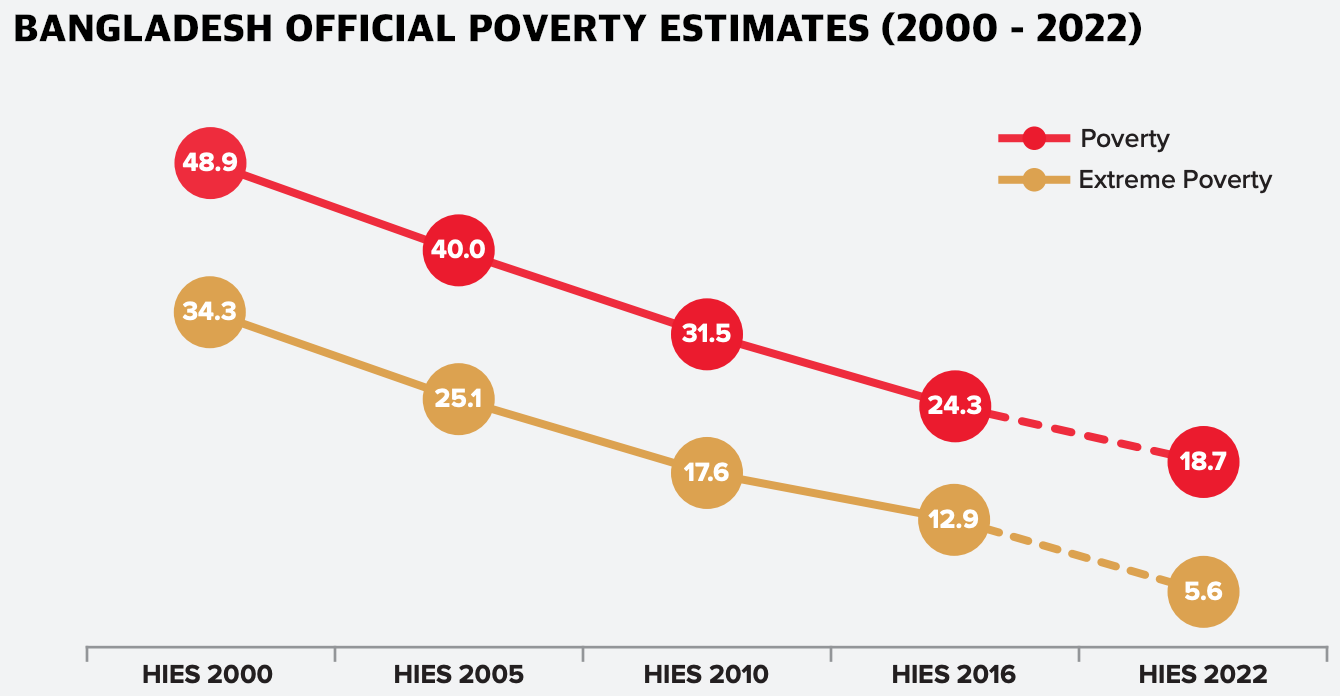Good News on Poverty in Bangladesh, Ecosystems in Ecuador, and Indigenous Fire Practices in Australia

This is our weekly roundup of good news from around the world. If you'd like to get this in your inbox, you can subscribe for free below.
Good news you didn't hear about
Nepal has made significant progress in basic and secondary education in the last five years. Between 2017 and 2022, the number of out-of-school children was reduced by 6.76%; high school completion rates increased from 11.5% to 33.1%; and 8.2 million students benefitted from direct interventions to enhance learning, of which 4.07 million were girls. World Bank
Nigeria is one of 12 countries that still haven't eliminated maternal and neonatal tetanus. It's getting closer though—last year, there were only 55 reported deaths nationwide, and the WHO just confirmed that the disease has been eliminated in the northwestern states of Benue, Kogi, Kwara, Nasarawa, Niger and Plateau, home to a combined 31.4 million people.
Schoolkids in eight US states—Minnesota, New Mexico, Colorado, Vermont, Michigan, Massachusetts, California and Maine—now receive free school meals, regardless of family income. Several other states are considering similar programs, and congressional supporters are working on legislation to extend universal free meals to every state. AP
Despite the pandemic and the polycrisis, the poverty rate in Bangladesh declined by 5.6% between 2016 to 2022, lifting almost ten million people out of poverty. The government has cut the extreme poverty rate in half in the last ten years and is now targeting a reduction of extreme poverty to 2.3% by 2031. Bangladesh Bureau of Statistics

Germany’s government has approved plans for new legislation, known as the Self-Determination Act, to make it easier for trans and non-binary people to change their names on legal documents such as birth or death certificates. 'We simply want to make life a bit easier for a small group for which it has great significance.' Pink News
The US FDA has approved the first vaccine for RSV for use during late pregnancy, giving the country a powerful new tool to protect young children. RSV is the country's leading cause of infant hospitalisation, resulting in half a million emergency room visits and 300 deaths in young children every year. Conversation
RIP Bindeshwar Pathak, social reformer and revolutioniser of national sanitation in India, who brought clean toilets to tens of millions, and in the process, liberated millions from demeaning work they were forced into by caste structures. 'One day all Indians, united in cleanliness, will worship together, dine together and bathe in the same pond.' Economist
As of last week, the Indian state of of Tamil Nadu has expanded its free breakfast scheme to 1.7 million students in government schools, with the stated aim of 'ensuring adequate nutrition, decreasing malnutrition incidents, improving school attendance and retention rates, as well as providing relief to working mothers.' Tribune
Earlier this month, more than 800,000 student loan borrowers in the United States started having their debts discharged, after the government announced it would forgive a combined $39 billion in federal student loan debt. In total, the Biden-Harris Administration has approved more than $116.6 billion in student loan forgiveness for more than 3.4 million borrowers.
When was the last time you heard news out of Spain that didn't involve wildfires, elections or sleazy football officials? How about this: in the next month, powerful new labour laws protecting vulnerable groups will go into force, Catalonia will implement a rent freeze f0r 80% of its population, and a wide-ranging animal welfare bill will come into effect. The Local
Even more good news you didn't hear about
MacKenzie Scott has given more than $14.1 billion to 1,621 charities since 2020. Latin America’s central banks declare victory in the war on inflation, and eight countries in the region have now banned e-cigarettes. Ghana has broken ground on a huge vaccine factory that will produce 600 million doses a year. Violent deaths in Brazil have reached their lowest level in 12 years. Germany just unveiled a draft bill legalising the use of recreational marijuana. Not all heroes wear capes—meet some of the extraordinary workers bringing health and nutrition to children in Afghanistan.
It's just $80 a year, or $8 a month, and a third of the fee goes straight to charity. Find out more by hitting the pink button.
The only home we've ever known
My heart is moved by all I cannot save:
so much has been destroyed
I have to cast my lot with those
who age after age, perversely,
with no extraordinary power,
reconstitute the world.
~ Adrienne Rich
In Pichincha, Ecuador, 120,722 hectares have recently been protected, safeguarding 13 different ecosystems, 67 endemic bird species, and water sources for local communities. The network links to a further 74,281 hectares of parks in Mejía, creating protected migration corridors for pumas, Andean bears and imperilled species like the Andean condor and the capuchin monkey.
The Canadian government is partnering with Arctic First Nations to develop a new protected area spanning 15,000 km2 of the Labrador Sea. In Baja California, indigenous fishing communities are advocating for the expansion of the Cabo Pulmo National Park, which was designated on the southeastern tip of the peninsula in 1995, resulting in a 465% increase in fish populations.
Four years ago, Montreal decided to make a 2.5-kilometre stretch of Mont-Royal Avenue car-free every summer, and after rave reviews from users and local businesses, a further nine streets have been transformed this year. 'Thick crowds almost around the clock, shopping, wandering or sinking into the baby-blue Adirondack chairs laid out for public use.' Energy Mix
Indigenous ranger groups in Australia have burned 23,000 km2 across the Great Sandy, Tanami, Gibson, and Great Victoria Deserts this year. 'The goal is to shift from wrong-way fire—where fuel builds up until large, damaging bushfires ignite—to right-way fire, culturally informed fire regimes led by traditional owners.' Conversation
185 countries have joined forces to launch a biodiversity fund. Canada and the UK made initial contributions, and further investment will come from governments, philanthropy, and the private sector. At least 36% of the fund’s resources will support the small island states and countries most vulnerable to climate change. Mongabay
Composting is already mandatory in Queens, New York, and will roll out across New York City and Brooklyn over the next year. The program requires residents to separate food scraps and yard waste from their trash and is thanks to the Zero Waste Act that passed this summer. NYT
The Biden administration has pledged $106 million for salmon recovery programs. The 16 projects will aid the recovery of 28 endangered salmon and steelhead species, including Central California Coast coho salmon and Sacramento River winter-run Chinook salmon. Florida Phoenix
A family-run environmental organisation in Indonesia called Sungai Watch has successfully removed 1.2 million kilograms of plastic from polluted rivers and mangroves; and out to sea, nonprofit The Ocean Cleanup has collected over 11,000 kilograms of trash from the Great Pacific Garbage Patch—the most rubbish cleared from a single extraction.
Our goal is to kind of put ourselves out of business. We don't want to be doing this forever and ever.
Alex Tobin, Ocean Cleanup
A landmark victory for sea turtles in Florida, home to over 90% of all sea turtle nests in the US, with the implementation of enhanced protections for critical nesting sites; and in Texas, the legislature has voted to invest $1 billion towards new state parks after decades of environmentalist activism. This is a big deal—only 2.4% of land in Texas is currently protected.
South Carolina has increased its protections for horseshoe crabs, and in Louisiana, restoration work has commenced on reconnecting wetlands to the Mississippi River to keep up with rising sea levels. 'By working with nature—instead of against it—coastal communities will once again be protected for generations to come.'
A prehistoric, flightless bird has been returned to the wild in New Zealand after it was deemed extinct in 1898. Thanks to decades of conservation work, 18 takahē were released onto the alpine slopes of South Island. Since the bird’s rediscovery in 1948, the population has increased by 8% a year to reach 500 today. Guardian
A Tasmanian devil breeding program in New South Wales has produced its 500th joey after ten years of 'blood, sweat and tears.' The program started with 44 disease-free devils in 2011, after 90% of the wild population was wiped out by a highly contagious and fatal facial tumour disease. ABC
Miyawaki forests in the New York Times! Tiny forests are popping up across the US, with sites in Washington, LA, and Cambridge. Based on the Miyawaki method, these native forests grow up to 10 times the speed of conventional planting, and these postage-stamp-sized plots are delivering big environmental benefits in cities around the world.
Hope Is A Verb
In our final episode of Season 1, we speak to Bala Amarasekaran, an accountant turned conservationist who founded the Tacugama Chimpanzee Sanctuary in Sierra Leone and empowered local communities to protect native forests and wildlife.
In this conversation, Bala shares his extraordinary story about how a chance encounter with a baby chimpanzee led to an epic conservation mission that’s spanned more than three decades, saved countless chimps and connected him with the legendary Dr Jane Goodall. A masterclass in what it takes to show up and answer a call to mend the planet - even if it’s not the path you planned for.
That's all for this week, thanks for reading! We're taking a break next week because of work commitments, so we'll see you in a fortnight.
With love,
FC HQ
